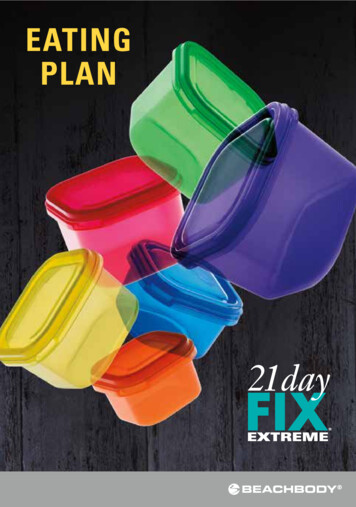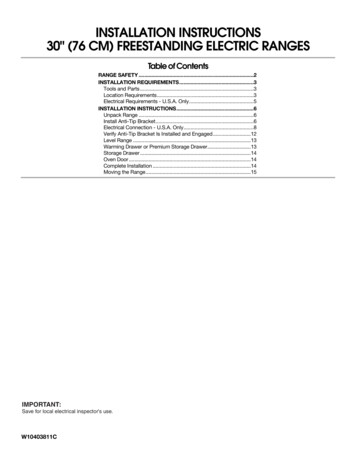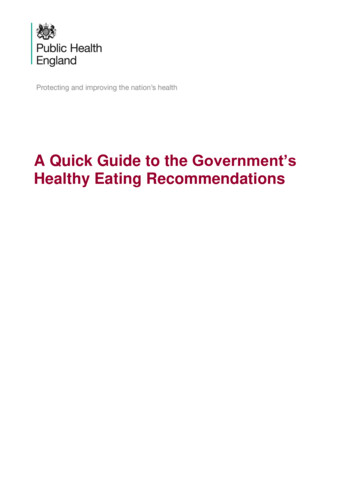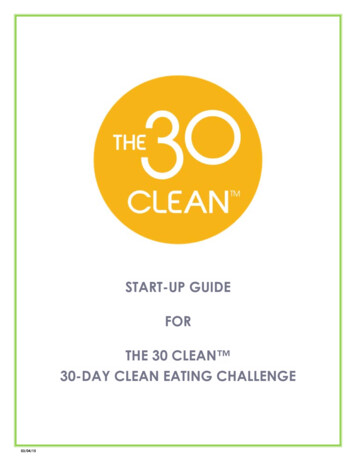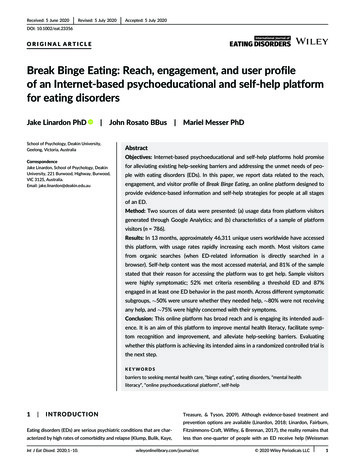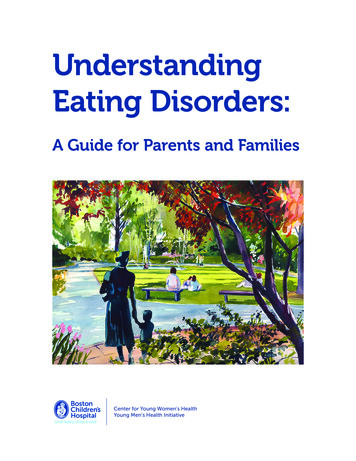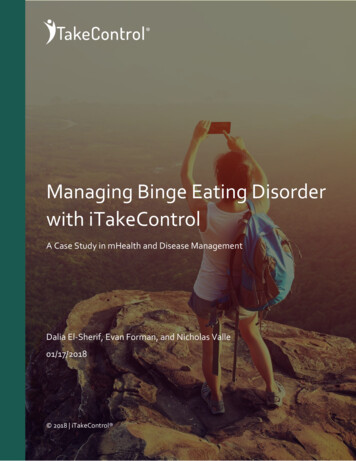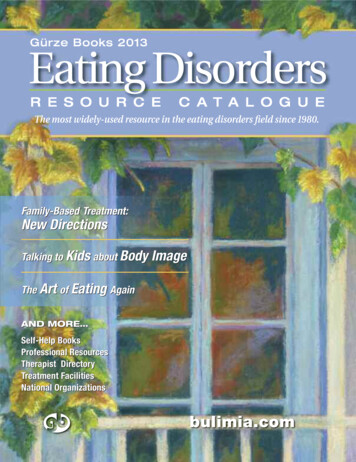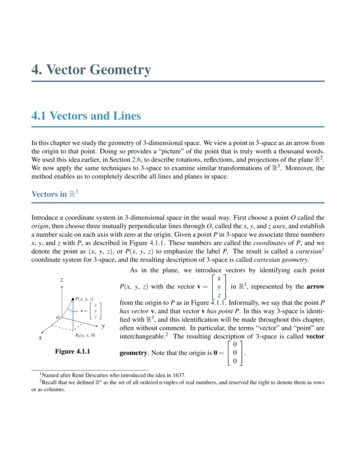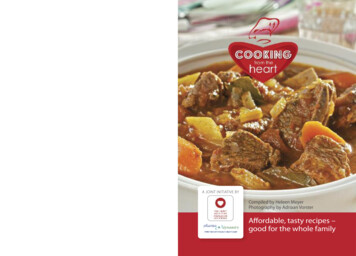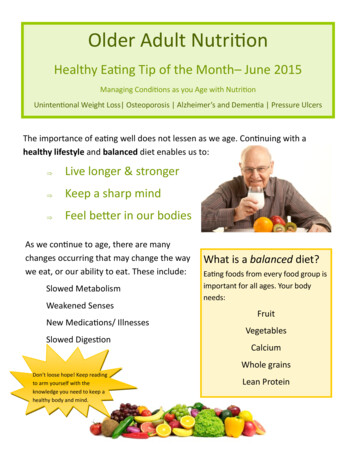
Transcription
Older Adult NutritionHealthy Eating Tip of the Month– June 2015Managing Conditions as you Age with NutritionUnintentional Weight Loss Osteoporosis Alzheimer’s and Dementia Pressure UlcersThe importance of eating well does not lessen as we age. Continuing with ahealthy lifestyle and balanced diet enables us to: Live longer & stronger Keep a sharp mind Feel better in our bodiesAs we continue to age, there are manychanges occurring that may change the waywe eat, or our ability to eat. These include:Slowed MetabolismWeakened SensesNew Medications/ IllnessesSlowed DigestionWhat is a balanced diet?Eating foods from every food group isimportant for all ages. Your bodyneeds:FruitVegetablesCalciumWhole grainsDon’t loose hope! Keep readingto arm yourself with theknowledge you need to keep ahealthy body and mind.Lean Protein
Unintentional Weight lossAlthough certainly not all senior citizens are underweight, unintentional weightloss in the elderly population, is one of the most dangerous health risks.Factors Effecting Weight Loss as weAge: Taste changes & Loss of appetite Oral health & Dental problemsTaste Changes:Our sense of taste and smell naturallyweaken with age. This often leads to di Reduced social activityminished appetite or adding more salt tofoods to try and recover the flavor weLoss of Appetite:once remembered. Similarly, our senseMany factors contribute to loss offor sweet tastes linger, leading manyappetite in the elderly population.elderly toWhile its true that metabolism slows overindulge.as we age, a significant change inSeason foods with herbs,weight in a short period of time canspices and citrus to addflavor without addingbe dangerous and should besodium!avoided. Compromised mobilityTry These Ideas! Have small frequent snacksthroughout the day Eat more nutrient and calorie densefoods Eat with companyNutrient dense foodsare foods that have morevitamins and minerals perbite.
Unintentional Weight lossOral Health & Dental Problems:Dry Mouth: As we age, many people experience dry mouth as aside effect of medications or reduced saliva production.Ill-Fitting Dentures: If you wear dentures, over time they may become ill-fitting. When dentures are not properly fitted, one mayexperience pain with eating or chewing.To relieve dry mouth, sipon water during mealsand suck on sugar-freehard candiesDysphagia: This condition is where it becomes more difficult tomove food or liquid from your mouth to your stomach. Dysphagia can occur at any age, but is most common in older adults.People who experience dysphagia will most likely need a texturemodified diet.Many people find that softertextures are more tolerable whenthey are faced with chewing andswallowing difficulties.Smoothies and shakes are a great way to packin nutrients and calories when chewingbecomes difficult. Blend a frozen banana, 2 tablespoons peanutbutter, 3 dates, 1 tablespoon of cocoa powder orchocolate syrup and 6 ice cubes together to createa protein packed breakfast shake. Jump on the green smoothie bandwagon! Blend 1cup of orange juice, a hearty handful of kale orspinach, half an avocado and 6 ice cubes for adelicious way to get in those hard-to-chew leafygreens.Or grab a blender and your favorite ingredients andstart mixing up your own favorite smoothie creations!
Unintentional Weight loss Home Delivery– Many grocery storesand restaurants will deliver right to yourdoorstep. Swap Services– Maybe a student orneighbor would be willing to shop foryou. Reach out and ask for help. Youmay find they don’t want anything inreturn. Share your Home– If you live in a largerhouse, consider having a housematewho would be willing to do the groceryshopping for you. Meals on Wheels– There are localservices in most towns that will deliverhot meals and sandwiches to qualifyingparticipants.Compromised Mobility:If you cannot cook or shop for yourself,eating a balanced healthy diet can seemimpossible at times. There are manyoptions available to you, so don’t getdiscouraged.Say “no” to eating alone: Make a lunch date with a friend oryour favorite niece. Join a class or a volunteer groupwhere you can meet like minded people and make new friends. Adult day care services will provideactivities and a healthy meal.Reduced Social Activity:Eating with other people is almost asimportant as eating a variety of foods,as it creates a more enjoyableatmosphere around eating. We tend toeat better if we enjoy meal times.
Osteoporosis:5 Nutrients for Healthy Strong BonesOsteoporosis is a medical condition where the bones become brittle and fragile from loss oftissue, typically as a result of hormonal changes, or deficiency of calcium or vitamin D.Did you Know?Although there is no known curefor osteoporosis, you canincrease your bone health byeating a diet rich in these 5nutrients:1 in 3 women & 1 in 5 men over the age of50 will experience an osteoporotic fracture.CalciumCalcium is not only important for bonestrength, but also for heart, nerves, andmuscles. If you don’t eat enough calcium, yourbody will start to take calcium that is stored inyour bones to be use in other places in yourbody, leaving you with weak brittle bones.Milk, cheese, yogurtleafy greens, beans,almonds, chia seeds,salmon, sardinesCheese, egg yolks, fattyfish, soy, fortified cereals,mushrooms, cod liver oilVitamin DVitamin D has many important jobs in the body, and isneeded to help you absorb calcium from the food youeat. The best way to get vitamin D naturally is fromsunlight, but some foods also provide vitamin D.MagnesiumIn order for vitamin D to help the body metabolizecalcium, it must first be converted to the activeform. Magnesium is the mineral that is necessaryto convert vitamin D to the active form. Magnesium is also important for bone mineralization thatprevents gout and arthritis.Nuts, fish, lentils,beans, whole grains,dried fruit, bananas,leafy vegetablesPotassiumPotassium helps to maintain fluid balances inthe body and protects bones by counterbalancing bone damaging acids.Vitamin KIn addition to improving cardiovascular health, havingadequate vitamin K in your diet reduces the risk of bonefractures in osteoporotic patients by playing a role inimproving bone mineralization.Dark leafy greens,bananas, potatoes,oranges, squash,yogurt, coconut water,tomatoesKale, collard greens,spinach, turnip greens,broccoli, cabbage, prunes
Alzheimer’s and Dementia:7 Nutrition Tips for Maintaining Brain HealthDementia is an overall term that is defined as the loss of memory, cognitive reasoning, awareness of environment, judgment, and/or abstract thinking as well asloss of the ability to perform usual tasks associated with self-care and day-to-dayfunctionIncrease your intake of plant based foods147Limit Intake of saturated and transfatsSaturated and trans fats have beenassociated with dementia. Saturated fat is found in animal productslike meat, eggs, and dairy whiletrans fats are found in many packaged foods. Avoid words like“partially hydrogenated oil” on foodlabels.Take a B12 supplementVitamin B12 is important for healthynerves and red blood cells. Somedementias are caused by a deficiency in vitamin B12 and are reversiblewhen treated. Choose a reliablesource of B12 such as fortified foodsor a supplement that provides atleast the recommended daily dose(2.4 micrograms for adults)**Consult your doctor or dietitianbefore taking any new supplements23Vegetables, fruits, legumes (beans, peas,and lentils) and whole grains should become primary staples of the diet. Increasingplant based foods in the diet will help youeat less saturated fats from meat and dairyas well as provide an abundance of phytochemicals.Consume 15 milligrams of vitamin E from foods every dayVitamin E is an antioxidant which scavenges toxic free radicals,which may contribute to cognitive impairment. Eat more seeds,nuts, leafy green vegetables, and whole grains to increase vitamin E in your diet.5Avoid vitamins with iron and copperWe now know there is a confirmed link betweenhigh levels of iron and copper and increased riskof Alzheimer’s . If you are using a multivitamin,choose one without iron and copper and onlytake an iron supplement if advised by yourphysician.6Exercise at least 120 minutes each weekAerobic exercise is associated with a reduced risk of cognitive impairment and dementia. Walking, swimming, raking the yard, orany other activity that increases you heart rate and breathingcounts!Choose aluminum-free productsWhile the details as to how aluminum contributes to Alzheimer’s isunder continuous investigation, itis recommended to reduce exposure to aluminum. Minimize aluminum cookware, antacids, bakingpowder, and other aluminum containing products
Pressure Ulcers & Other Skin ConditionsPressure ulcers form when an areaof skin is subjected to constant pressureor friction. However, what many peopledon’t know is that you can arm yourselffrom getting pressure ulcers and healfaster if you are receiving adequatenutrition.Eat enough calories:If you are losing weight or are eating lessthan 75% of your daily needs or less than75% of you normal intake, consult yourphysician or dietitian.For a quick estimationof calories that yourbody needs, multiply 11by your weight inpounds.Drink fluids throughout the day to stayhydrated:The body is made up of 50-60% water. Water also moves nutrients where they areneeded to help heal wounds. Aim for 6-8cups of water each day.Have you seen any ofthese pressure ulcerson yourself or a lovedone?Eat protein at every meal:Your body needs protein to grow newcells and heal your wounds, or preventwounds from occurring. Including oneprotein source at each meal will help tomake sure you are gettingenough proteinTake a multivitamin with minerals:Did you know?12-25% of residents in long-termcare facilities are dehydrated.Protein foods:Chicken, Beef, PorkFishEggsTofuBeansNuts and Nut ButtersCheese, Milk, YogurtUnless there is a known deficiency, thereis no need to mega dose on any particular vitamin or mineral but taking a daily multivitamin will help you to receiveall the essential vitamins that you need each day.**Always consult your physician or dietitian before startinga new supplement
References1.Agrawal, Mukta. "Nutrients That Prevent Osteoporosis and Their Natural Food Sources." INLIFE. N.p., 29 Aug. 2014. Web. 07 Apr. 2015.2.Ahlskog, J.Eric, Yonas E. Geda, Neill R. Graff-Radford, and Ronald C. Petersen. "Physical Exercise as a Preventive or Disease-Modifying Treatment of Dementia and Brain Aging." Mayo Clinic Proceedings 86.9 (2011): 876-84.PubMed. Web. 07 Apr. 2015.3.Barnard, Neal D. "Saturated and Trans Fats and Dementia: A Systematic Review." Neurology of Aging 35 (n.d.): S65-73. Eselvier. Web. 7 Apr.2015.4."Common Dental Problems." Mouth Healthy. American Dental Association, Web. 11 Apr. 2015.5."Dietary Guidelines for Alzheimer's Prevention." Physician's Committee for Responsible Medicine. N.p., n.d. Web. 07 Apr. 2015.6.Donini, L. M. "Eating Habits and Appetite Control in the Elderly: The Anorexia of Aging." International Psychogeriatrics 15.1 (2003): 7387.PubMed. Web. 10 Apr. 2015.7."Dysphagia." Mayo Clinic., 15 Oct. 2014. Web. 11 Apr. 2015.8."Eating Well as You Age." : Nutrition and Diet Tips for Healthy Eating as You Age. HelpGuide.org, 2015. Web. 10 Apr. 2015.Farina, N. "Vitamin E for Alzheimer's Dementia and Mild Cognitive Impairment." Cochraine Database of Systematic Reviews (2008): n. pag. Web.07 Apr. 2015.9.Loef, Martin, and Harald Walach. "Copper and Iron in Alzheimer's Disease: A Systematic Review and Its Dietary Implications." British Journal ofNutrition107.01 (2012): 7-19. PubMed. Web. 07 Apr. 2015.10."NPUAP White Papers." The National Pressure Ulcer Advisory Panel NPUAP. N.p., Apr. 2015. Web. 12 Apr. 201511."Older Adult Nutrition." NCM. American Dietetic Association, Web.12. Osimani, A. "Neuropsychology of Vitamin B12 Deficiency in Elderly Dementia Patients and Control Subjects." Journal of Geriatric Psychiatryand Neurology18.1 (2005): 33-38. PubMed. Web. 07 Apr. 2015.13. "Osteoporosis & Musculoskeletal Disorders." International Osteoporosis Foundation. N.p., 2015. Web. 6 Apr. 2015.14. "Pressure Ulcers and Other Skin Conditions." Nutrition Care Manual. Academy of Nutrition and Dietetics. Web. 09 Apr. 2015.15. Smith, Glen, PhD. "Can Vitamin B-12 Improve Memory in Alzheimer's Disease?" Alzheimer's Disease. Mayo Clinic, 30 May 2014. Web. 07 Apr.2015.16. Tomljenovic, L. "Aluminum and Alzheimer's Disease: After a Century of Controversy, Is There a Plausible Link?" Journal of Alzheimer's Disease 23.4 (2011): 567-98. PubMed. Web. 07 Apr. 2015.17. Tucker, K. L. "Osteoporosis Prevention and Nutrition." U.S. National Library of Medicine. Current Osteoporosis Reports, Dec. 2009. Web. 07Apr. 2015.18. Zwiefelhofer, Debbie, RD,LD. "Pressure Ulcers." Novartis Medical Nutrition, Oct. 2007. Web. 10 Apr. 2015.Created by Katrina Koller, Dietetic InternPatient Food and Nutrition Services300 N. Ingalls StreetNIB NI8E20Ann Arbor, MI 48109-5407(734) 936-5197
healthy lifestyle and balanced diet enables us to: . While its true that metabolism slows as we age, a significant change in weight in a short period of time can . For a quick estimation of calories

